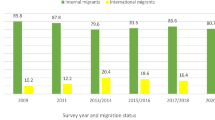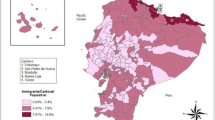Abstract
Expectations held by economic migrants about improving their post-mobility life satisfaction are not always met. Therefore, there is a need to guide the design of evidence-based policies and interventions to enhance life satisfaction equity between immigrant and host populations in receiving contexts. This study aims to identify the main determinants that impact life satisfaction of economic migrants coming from developing countries and settled in receiving societies that have a very high Human Development Index according to the United Nations Development Programme (Human Development Indices and Indicators, 2018, New York: UNDP). Following a systematic review process using the PubMed, PsycINFO, Scopus, and Web of Science databases, 30 articles published between 2005 and 2018 were selected. The results indicate that economic migrants’ life satisfaction is facilitated by twelve determinants across three categories: structural integration (access to culturally competent community resources, housing conditions, legal status, and working conditions); social and cultural inclusion (adaptation to the target culture, community engagement, perceived discrimination, and social support network); and individual strengths (financial security, health, linguistic competence, and roots). An integrative conceptual framework of economic migrants’ life satisfaction is provided and implications for research and professional intervention in the field are discussed.

Similar content being viewed by others
References
References preceded by an asterisk correspond to publications included in the systematic review.
Angelini, V., Casi, L., & Corazzini, L. (2015). Life satisfaction of immigrants: does cultural assimilation matter? Journal of Population Economics, 28, 817–844.
Arksey, H., & O’Malley, L. (2005). Scoping studies: towards a methodological framework. International Journal of Social Research Methodology, 8(1), 19–32.
Arpino, B., & de Valk, H. (2018). Comparing life satisfaction of immigrants and natives across Europe: the role of social contacts. Social Indicators Research, 137, 1163–1184.
Bachman, J., Kahn, R. L., Davidson, T., & Johnston, L. (1967). Youth in transition (Vol. 1). Ann Arbor: Institute for Social Research.
Bak-Klimek, A., Karatzias, T., Elliott, L., & Maclean, R. (2015). The determinants of well-being among international economic immigrants: a systematic literature review and meta-analysis. Applied Research in Quality of Life, 10, 161–188.
Bosswick, W., & Heckmann, F. (2006). Integration of migrants: Contribution of local and regional authorities. Ireland: European Foundation for the Improvement of Living and Working Conditions.
*Calvo, R., & Cheung, F. (2018). Does money buy immigrant happiness? Journal of Happiness Studies, 19(6), 1657–1672.
Carr, S. C. (2010). The psychology of global mobility. New York: Springer.
CEAR. (2019). Informe 2019: Las personas refugiadas en España y Europa. Madrid: Comisión Española de Ayuda al Refugiado.
*Chaumba, J. (2017). Career development, well-being and coping-strategies of Zimbabwean immigrants in the United States: a research note. Journal of Sociology and Social Welfare, 44(1), 27–40.
Chu, Y., Shen, C., & Yang, J. (2018). Country-level bonding, bridging, and linking social capital and immigrants’ life satisfaction. Applied Research in Quality of Life, 13, 745–759.
*Cobb, C. L., Meca, A., Branscombe, N. R., Schwartz, S. J., Xie, D., Zea, M. C., Fernandez, C. A., & Sanders, G. L. (2019). Perceived discrimination and well-being among unauthorized Hispanic immigrants: the moderating role of ethnic/racial group identity centrality. Cultural Diversity and Ethnic Minority Psychology, 25(2), 280–287.
de Jong, G. F., Chamratrithirong, A., & Tran, Q. G. (2002). For better, for worse: life satisfaction consequences of migration. International Migration Review, 36(3), 838–863.
*de Luca, S., Bobowik, M., & Basabe, N. (2011). Sociocultural adaptation of Brazilian immigrants in the Basque Country: wellbeing and acculturation. Revista de Psicología Social, 26(2), 275–294.
*de Vroome, T., & Hooghe, M. (2014). Life satisfaction among ethnic minorities in the Netherlands: immigration experience or adverse living conditions? Journal of Happiness Studies, 15(6), 1389–1406.
Diener, E., Emmons, R. A., Larsen, R. J., & Griffin, S. (1985). The satisfaction with life scale. Journal of Personality Assessment, 49(1), 71–75.
Diener, E., & Biswas-Diener, R. (2003). Findings on subjective well-being and their implications for empowerment. Workshop on Measuring Empowerment: Cross-Disciplinary Perspectives. Washington DC: World Bank.
Diener, E., Lucas, R. E., & Oishi, S. (2005). Handbook of positive psychology. Oxford: Oxford University Press.
Downs, S. H., & Black, N. (1998). The feasibility of creating a checklist for the assessment of the methodological quality both of randomised and non-randomised studies of health care interventions. Journal of Epidemiology and Community Health, 52(6), 377–384.
*Fassbender, I., & Leyendecker, B. (2018). Socio-economic status and psychological well-being in a sample of Turkish immigrant mothers in Germany. Frontiers in Psychology, 9, 1586.
Frank, K., & Hou, F. (2018). Over-education and well-being: how does education-occupation mismatch affect the life satisfaction of university-educated immigrant and non-immigrant workers? Ethnicity & Health, 23(8), 884–901.
García-Ramírez, M., De la Mata, M., Paloma, V., & Hernández-Plaza, S. (2011). A liberation psychology approach to acculturative integration of migrant populations. American Journal of Community Psychology, 47(1–2), 86–97.
*Haagsman, K., Mazzucato, V., & Dito, B. B. (2015). Transnational families and the subjective wellbeing of migrant parents: Angolan and Nigerian parents in the Netherlands. Ethnic and Racial Studies, 38(15), 2652–2671.
Hadjar, A., & Backes, S. (2013). Migration background and subjective well-being: a multilevel analysis based on the European social survey. Comparative Sociology, 12(5), 645–676.
Hendriks, M. (2015). The happiness of international migrants: a review of research findings. Migration Studies, 3(3), 343–369.
Hendriks, M., & Bartram, D. (2016). Macro-conditions and immigrants’ happiness: is moving to a wealthy country all that matters? Social Science Research, 56, 90–107.
Hernández-Plaza, S., Alonso-Morillejo, E., & Pozo-Muñoz, C. (2005). Social support interventions in migrant populations. British Journal of Social Work, 36(7), 1151–1169.
Hernández-Plaza, S., García-Ramírez, M., Camacho, C., & Paloma, V. (2010). New settlement and wellbeing in oppressive contexts: A liberation psychology approach. In S. C. Carr (Ed.), The psychology of global mobility (pp. 235–256). New York: Springer.
Huddleston, T., Niessen, J., & Tjaden, J. D. (2013). Using EU indicators of immigrant integration: Final report for directorate-general for home affairs. Brussels: European Commission.
IOM. (2013). World migration report 2013: Migrant well-being and development. Geneva: International Organization for Migration.
IOM. (2019). World migration report 2020. Geneva: International Organization for Migration.
*Joarder, M. A. M., Harris, M., & Dockery, A. M. (2017). Remittances and happiness of migrants and their home households: evidence using matched samples. The Journal of Development Studies, 53(3), 422–443.
Kim, H., & Won, S. (2015). Experiences of discrimination and its effect on life satisfaction: understanding differences within subgroups of foreign spouses from multicultural families in Korea. Asian Social Science, 11(26), 64–74.
*Kim, W. G., Choi, H. M., & Li, J. (2016). Antecedents and outcomes of migrant workers’ sociocultural adjustment in the hospitality industry. International Journal of Hospitality Management, 58, 1–12.
Knox, V., Hill, C. J., & Berlin, G. (2018). Can evidence-based policy ameliorate the nation’s social problems? The Annals of the American Academy, 678, 166–179.
*Leung, D. D. M., & Tang, E. Y. T. (2018). Correlates of life satisfaction among southeast Asian foreign domestic workers in Hong Kong: an exploratory study. Asian and Pacific Migration Journal, 27(3), 368–377.
*Martínez-Taboada, C., Albeza, A., Amutio, A., & Nicolae, G. (2017). La predicción afectiva positiva como factor de protección socioemocional en madres transnacionales antes y después de la reagrupación familiar: Relación con la satisfacción con la vida, regulación emocional, soledad social, resiliencia y estrés. Terapia Psicológica, 35(2), 173–183.
*Marzana, D., Alfieri, S., & Marta, E. (2016). The multidimensional nature of young immigrants’ well-being. Rivista Internazionale di Scienze Sociali, 132(1), 21–40.
*Mazzucato, V., Dito, B. B., Grassi, M., & Vivet, J. (2017). Transnational parenting and the well-being of Angolan migrant parents in Europe. Global Networks, 17(1), 89–110.
*Meca, A., Cobb, C., Xie, D., Schwartz, S. J., Allen, C., & Hunter, R. (2017). Exploring adaptive acculturation approaches among undocumented Latinos: a test of Berry’s model. The Counseling Psychologist, 45(8), 1115–1140.
*Moreno-Jiménez, M. P., & Hidalgo, C. M. (2011). Measurement and prediction of satisfaction with life in immigrant workers in Spain: differences according to their administrative status. Anales de Psicología, 27(1), 179–185.
*Murillo-Muñoz, J., & Molero-Alonso, F. (2012). Psychosocial factors associated with the well-being of Colombian immigrants to Spain. Psychosocial Intervention, 21(3), 319–329.
*Murillo-Muñoz, J., & Molero-Alonso, F. (2016). Relationship between life satisfaction and other psychological variables of Colombian immigrants in the United States. Revista Colombiana de Psicología, 25(1), 15–32.
*Murphy, E. J., & Mahalingam, R. (2006). Perceived congruence between expectations and outcomes: implications for mental health among Caribbean immigrants. American Journal of Orthopsychiatry, 76(1), 120–127.
*Ngo, H. Y., & Li, H. (2016). Cultural identity and adaptation of mainland Chinese immigrants in Hong Kong. American Behavioral Scientist, 60(5–6), 730–749.
Oishi, S., Diener, E., Lucas, R.E., & Suh, E. (1999).Cross-cultural variations in predictors of life satisfaction: Perspectives from needs and values. Personality & Social Psychology Bulletin, 25, 980–90
OPAM. (2019). Opiniones y actitudes de la población andaluza ante la inmigración. Sevilla: Dirección General de Coordinación de Políticas Migratorias, Junta de Andalucía.
Paloma, V. (Coord.) (2017). Experimentos virtuales de intervenciones sociales para la mejora del bienestar inmigrante en Andalucía. Sevilla: Fundación Pública Centro de Estudios Andaluces, Junta de Andalucía.
Paloma, V., Herrera, I., & García-Ramírez, M. (2009). The psychopolitical validation of health research for minorities: conceptualizing well-being among Moroccan immigrants. International Journal of Migration, Health and Social Care, 5(1), 25–33.
*Paloma, V., García-Ramírez, M., & Camacho, C. (2014). Well-being and social justice among Moroccan migrants in southern Spain. American Journal of Community Psychology, 54(1–2), 1–11.
Paparusso, A. (2019). Studying immigrant integration through self-reported life satisfaction in the country of residence. Applied Research in Quality of Life, 14, 479–505.
Pavot, W., & Diener, E. (1993). Review of the satisfaction with life scale. Psychological Assessment, 5, 164–172.
Perestelo-Pérez, L. (2013). Standards on how to develop and report systematic reviews in psychology and health. International Journal of Clinical and Health Psychology, 13(1), 49–57.
*Raffaelli, M., Tran, S. P., Wiley, A. R., Galarza-Heras, M., & Lazarevic, V. (2012). Risk and resilience in rural communities: the experiences of immigrant Latina mothers. Family Relations, 61(4), 559–570.
*Ramos, A. K., Carvajal-Suarez, M., Leon, M., & Trinidad, N. (2017). Sense of community, participation, and life satisfaction among Hispanic immigrants in rural Nebraska. Kontakt, 19(4), e284–e295.
*Ryabichenko, T. A., & Lebedeva, N. M. (2016). Assimilation or integration: similarities and differences between acculturation attitudes of migrants from Central Asia and Russians in Central Russia. Psychology in Russia: State of the Art, 9(1), 98–111.
*Schmitz, P. G., & Schmitz, F. (2012). Emotional intelligence and acculturation. Psicología Conductual: Revista Internacional Clínica y de la Salud, 20(1), 15–41.
Soriano-Miras, R. M., Trinidad-Requena, A., & Guardiola, J. (2019). The well-being of Moroccan immigrants in. Spain: A composite indicator. Social Indicators Research. https://doi.org/10.1007/s11205-019-02215-8.
*Sung, M., Chin, M., Lee, J., & Lee, S. (2013). Ethnic variations in factors contributing to the life satisfaction of migrant wives in South Korea. Family Relations: An Interdisciplinary Journal of Applied Family Studies, 62(1), 226–240.
*Tonsing, K. N. (2013). Predictors of psychological adaptation of south Asian immigrants in Hong Kong. International Journal of Intercultural Relations, 37(2), 238–248.
United Nations Development Programme. (2018). Human development indices and indicators statistical update. New York: UNDP.
*Uskul, A. K., & Greenglass, E. (2005). Psychological wellbeing in a Turkish-Canadian sample. Anxiety, Stress and Coping, 18(3), 269–278.
*Vukojević, V., Kuburić, Z., & Damjanović, A. (2016). The influence of perceived discrimination, sense of control, self-esteem and multiple discrepancies on the mental health and subjective well-being in Serbian immigrants in Canada. Psihologija, 49(2), 105–127.
*Walker, G. J., & Ito, E. (2017). Mainland Chinese Canadian immigrants’ leisure satisfaction and subjective well-being: results of a two-year longitudinal study. Leisure Sciences, 39(2), 174–185.
Funding
This work was supported by the Regional Government of Andalusia’s Directorate General for the Coordination of Migration Policies under Grant CONTR/2018/51619.
Author information
Authors and Affiliations
Corresponding author
Additional information
Publisher’s Note
Springer Nature remains neutral with regard to jurisdictional claims in published maps and institutional affiliations.
Appendix
Appendix
Rights and permissions
About this article
Cite this article
Paloma, V., Escobar-Ballesta, M., Galván-Vega, B. et al. Determinants of Life Satisfaction of Economic Migrants Coming from Developing Countries to Countries with Very High Human Development: a Systematic Review. Applied Research Quality Life 16, 435–455 (2021). https://doi.org/10.1007/s11482-020-09832-3
Received:
Accepted:
Published:
Issue Date:
DOI: https://doi.org/10.1007/s11482-020-09832-3




